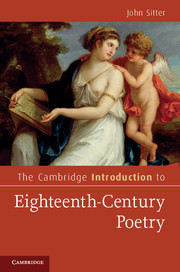Chapter 6 - Satiric poetry
from Part II - Poetic consciousness
Published online by Cambridge University Press: 05 June 2012
Summary
The term “satiric poetry” seems preferable to “verse satire” as a general rubric for the major poetic satires of the eighteenth century because “verse” now usually implies something less than genuine poetry, as in “light verse.” That latter category will hardly contain poems such as Dryden’s MacFlecknoe or Absalom and Achitophel, most of Pope’s work, Johnson’s London and Vanity of Human Wishes, and several others to be considered here. “Satiric poetry” challenges the suggestion that poetry and satire are mutually exclusive and insists on the status of the works as poems, on the same model as “elegiac poetry” or “lyric poetry.” By doing so we can best approach our subject as a kind of poetry – appreciating it fundamentally as poetry that shares many of the resources of other kinds of eighteenth-century poetry – rather than as satire that happens to have been poured into a poetic mold. Satiric poetry is most usefully seen as part of a poetic continuum.
Enough of the period’s most interesting poems take the form of satire to call for sustained attention to this poetic variety and for at least a working definition of satire as we proceed. Of the scores of books on satire, one of the few to offer a concise definition is Swift and the Satirist’s Art by Edward W. Rosenheim, Jr., and it seems to me the most satisfactory: “satire consists of an attack by means of a manifest fiction upon discernible historic particulars.” Somewhat surprisingly, Rosenheim does not include the word “comic,” which quickly comes to mind in thinking of many satires. But in his view, the element of “manifest fiction” – that is, fiction meant to be recognized as such – differentiates satiric works from straightforward attacks, just as the inclusion of “historic particulars” differentiates satires from criticism of universal human limitations. Rosenheim posits a “satiric spectrum,” recognizing the large differences in tone, for example, between mild “persuasive” satires and harsh “punitive” ones. We might also recognize that some works lean more heavily on particulars than others (Pope’s Dunciad compared to Johnson’s The Vanity of Human Wishes, for example), and that the fictional element might be a full-blown narrative or merely conspicuous exaggeration.
- Type
- Chapter
- Information
- The Cambridge Introduction to Eighteenth-Century Poetry , pp. 93 - 113Publisher: Cambridge University PressPrint publication year: 2011



